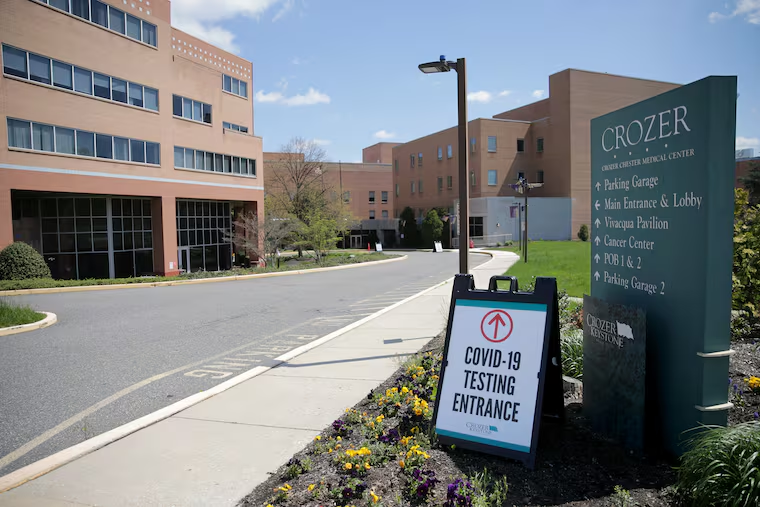Piles of biohazard bags, delayed medications: inspection reports find ongoing problems at Crozer-Chester
Crozer Chester Medical Center in Delaware County received a D rating for hospital safety earlier this month.

Biohazard waste bags piled on the loading dock, urgent medications delayed for hours and a nurse who was allowed to work without a Pennsylvania license — these are among the safety violations flagged so far this year at Crozer-Chester Medical Center.
State inspectors made at least a dozen visits to the Delaware County hospital to investigate potential safety problems between January and the beginning of October, more than any other hospital in Philadelphia and the surrounding four Pennsylvania counties, according to The Inquirer’s analysis of publicly available reports.
Hospital inspection reports detail ongoing concerns at Crozer-Chester, despite assurances by its leaders that a recent national report pointing out issues at the hospital was out-of-date.
» READ MORE: How safe is your hospital? See the letter grade for each Philly-area facility in a new national report.
Earlier this month, Crozer-Chester was among two Philadelphia-area hospitals to receive a D rating from the hospital safety ranking organization Leapfrog. The other, Taylor Hospital, is also part of Crozer Health, a for-profit health system owned by Prospect Medical Holdings.
In response, Crozer Health CEO Anthony Esposito said he had prioritized safety improvements since his arrival in July 2022. Leapfrog’s assessment, which used data from 2021 and 2022, did not reflect current safety protocol, he said in an emailed statement.
But state inspection reports show continued safety violations at the 300-bed hospital, which is located in Upland and serves a high proportion of low-income patients from Chester and the surrounding area.
Crozer declined to comment on the inspection findings.
On Oct. 5, inspectors cited the hospital for failing to give two patients medications labeled with a “NOW” order — which “indicates extreme urgency, commanding a no-delay response,” according to hospital protocol, and must be given within 30 minutes.
In one case, emergency department staff ordered a high dose of acetaminophen that the patient did not receive until an hour and a half later. In the patient’s file, a nurse attributed the delay to “nursing judgment.” Another patient prescribed an IV medication for infection control did not receive it for almost five and a half hours, which nurses noted in the patient file was due to “other priority of care.”
In response, the hospital agreed to retrain emergency nurses on medication protocol and to audit medication records.
Here’s what else the reports showed:
Sept. 8: Inspectors cited the hospital for employing a nurse who was not licensed in Pennsylvania. A nurse trainee licensed in Delaware had been allowed to enroll in a training program before completing the process to become licensed in Pennsylvania. In response, Crozer agreed to audit all new nurse human resource onboarding files to confirm license information.
Aug. 3-29: Inspectors monitored the hospital following reports of a cyber attack. They found the attack was real and that Crozer’s IT systems were not functioning as a result. The hospital took action to address the problem before the state’s investigation.
Jul. 28: Inspectors cited the hospital for failing to record vital signs for an emergency department patient every two hours as required. In response, the hospital agreed to retrain staff on protocol and audit patient records.
Jun. 21: Inspectors found a complaint about improper hazardous waste handling was valid, but that the hospital had resolved the issue before they arrived, properly labeling medical waste and storing it in a secure location.
May 19: Inspectors cited the hospital for failing to develop and document individualized treatment plans for two behavioral health patients. In both cases, a nurse had initiated a treatment plan, but no records showed that the plan had been reviewed or approved by a doctor. In response, the hospital retrained the head of its geropsychiatry department on treatment plan protocol and agreed to audit patient cases.
April 5: Inspectors cited Crozer-Chester for failing to properly dispose of biohazard waste. During repeat visits in March, they found piles of trash bags and biohazard bags on the loading dock. Hospital staff confirmed that the waste hadn’t been picked up between March 10 and March 27. In response, the hospital agreed to retrain staff on biohazard waste disposal and audit disposal practices five times a week.
Jan. 5: Inspectors cited Crozer-Chester for closing its kidney transplant program without providing the required 60 days notice. On Dec. 29, 2022, the hospital notified the Centers for Medicare & Medicaid Services that it planned to close the transplant center 18 days later, on Jan. 16.
On five other occasions (Feb. 21, April 10, May 9. July 6 and Sept. 8), inspectors investigated a complaint at the hospital and found it was in compliance with all safety requirements.
The Pennsylvania Department of Health routinely inspects hospitals to ensure they are safe for patients and that staff are following all safety protocols. Inspectors may also visit when a someone files a complaint.
Not all safety violations trigger an on-site investigation from inspectors. Hospitals are required to self-report the most serious safety violations and often work directly with the state to address them. Complaint details are not made public when inspectors determine it was unfounded.
» READ MORE: A Hospital Mistake Almost Killed Him
The Inquirer tracks publicly available hospital reports related to complaints, special monitoring, and general safety inspections. The Inquirer does not track inspections for new equipment or occupancy surveys, unless problems are identified.
Inspection reports are publicly available online and are released 40 days after the report is completed.